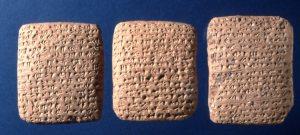Convince Me There’s A God – Archaeology 17
“And it came to pass in the four hundred and eightieth year after the children of Israel had come out of the land of Egypt, in the fourth year of Solomon’s reign over Israel, in the month of Ziv, which is the second month, that he began to build the house of the Lord.” 1 Kings 6:1
 As an atheist, I thought the Bible was a bunch of fairy tales. I grew up learning stories in the Bible about Adam and Eve, Noah and the Ark, Abraham and Isaac, Jacob and Joseph, Moses parting the water, Joshua knocking down the wall of Jericho, Samson and his super strength, David killing Goliath, Solomon and his wisdom; but that’s all they were to me – just stories. I didn’t think any of it was true, not even stories about Jesus of Nazareth dying and rising.
As an atheist, I thought the Bible was a bunch of fairy tales. I grew up learning stories in the Bible about Adam and Eve, Noah and the Ark, Abraham and Isaac, Jacob and Joseph, Moses parting the water, Joshua knocking down the wall of Jericho, Samson and his super strength, David killing Goliath, Solomon and his wisdom; but that’s all they were to me – just stories. I didn’t think any of it was true, not even stories about Jesus of Nazareth dying and rising.
It was during my investigation into the truth claims of the Bible and Christianity in 1971 that I came face to face with a mountain of historical and archaeological evidence that challenged my long-held belief that there was ‘zero’ evidence supporting any of the claims of the Bible.
As I read through the Old Testament in early 1971 and asked Christians questions about what I was reading, I saw that the Bible included hundreds of names, numbers and events that could be verified or falsified. I found that interesting for a document that was supposedly written by unknown writers centuries after it was reputed to have been written. If the goal of writing the Bible was to ‘fool’ people into believing it was the ‘Word of God,’ why write anything that could be investigated? Why indeed!
The reign of Israel’s King Solomon is a known quantity – sometime during the early part of the 10th Century B.C. Using the specific dates provided in 1 Kings 6 and reversing the calendar 480 years places Israel’s exodus from Egypt about the middle of the 15th Century B.C. My question was simple – did historical or archaeological evidence support that date for the Exodus, ‘if’ there ever was an Exodus of Israel from Egypt?
“So the Lord’s anger was aroused against Israel, and He made them wander in the wilderness forty years, until all the generation that had done evil in the sight of the Lord was gone.” Numbers 32:13
This is where it got interesting for me. I was working with the Bible’s date for the Exodus of about 1460-1450 B.C. and Israel wandering in the desert for 40 years. Here’s what the Bible says God told the man who became Israel’s leader after Moses died.
“After the death of Moses the servant of the Lord, it came to pass that the Lord spoke to Joshua the son of Nun, Moses’ assistant, saying: ‘Moses My servant is dead. Now therefore, arise, go over this Jordan, you and all this people, to the land which I am giving to them—the children of Israel. Every place that the sole of your foot will tread upon I have given you, as I said to Moses. From the wilderness and this Lebanon as far as the great river, the River Euphrates, all the land of the Hittites, and to the Great Sea toward the going down of the sun, shall be your territory. No man shall be able to stand before you all the days of your life; as I was with Moses, so I will be with you. I will not leave you nor forsake you. Be strong and of good courage, for to this people you shall divide as an inheritance the land which I swore to their fathers to give them.” Joshua 1:1-6
According to the Bible Joshua did what God commanded him to do and led the children of Israel across the Jordan River and marched them to Jericho. In what might be called an unusual military tactic, Joshua and the people of Israel marched around the walled city of Jericho for seven days. This is what the Bible says happened on the seventh day.
“So the people shouted when the priests blew the trumpets. And it happened when the people heard the sound of the trumpet, and the people shouted with a great shout, that the wall fell down flat. Then the people went up into the city, every man straight before him, and they took the city.” Joshua 6:20
Based on the Bible’s own dating, Israel’s defeat of Jericho would have occurred in the latter part of the 15th Century B.C. That event might be something history or archaeology could verify or falsify. As a journalist I found this interesting. If true, what a story it would have been to cover. If not, then the story could be used to falsify many other stories in the Bible.
We first see Joshua in the Bible in Exodus 17 when Moses told him to choose some men from Israel to fight with attackers from the family of Amalek. Amalek was the grandson of Esau, the brother of Jacob (Israel). That meant the men of Amalek who attacked Israel in the wilderness were distant relatives. Joshua and his warriors defeated Amalek and his people with the edge of the sword (Exodus 17:13). I did not find any archeological finds that supported the existence of the Amelekites, but did notice that the Bible claimed God told Moses He would “utterly blot out the remembrance of Amalek from under heaven.” (Exodus 17:14)
Joshua is named many other times in the Bible as serving Moses until the day Moses appointed Joshua to take his place as Israel’s leader (Deuteronomy 31:7-8). According to the Bible it was Joshua who led Israel into the “promised land” and defeated the many city-states in Canaan. Question: does any other ancient document mention Joshua’s name? It would seem that someone who led an entire nation of people out of the wilderness to destroy the armies of many ancient cities might be mentioned in documents other than the Bible.

© Trustees of the British Museum
The name “Joshua” does appear in the Amarna Tablets in Egypt from about the latter part of the 15th Century B.C., about the same time as the Bible’s claim of when Joshua would have led Israel into Canaan. The tablets were discovered in Egypt by a peasant woman in 1888 A.D. The British archaeologist and Egyptologist William Flinders Petrie found more than 20 fragments between 1891 and 1892. The French archaeologist Emile Chassinat acquired more tablets in 1903.
Scholars who studied the tablets learned they were letters written by rulers of different cities in Canaan and Syria to Egyptian pharaohs. Hundreds of the tablets were written in Akkadian, which was the international language of the time and used for business and diplomatic communications between Egypt and Egyptian-controlled areas. Many of the letters were from city-state leaders asking Egypt for help in dealing with a conquering force known as the ‘Habiru’ (also spelled Hapiru) during the approximate time the Bible claims Joshua was leading Israel into Canaan.
Here are some examples of the letters concerning the Habiru:
British Museum Number E29832
(See here about controversy concerning who were the Habiru)
The name “Joshua” appears in one of the Amarna Tablets, written by Mut Baal to Yanhamu, an Egyptian official.
“As the King my Lord liveth, Job is not in Pihilim! Indeed, two months ago he broke way. As to this, ask Biennima, ask Tadua, ask Jeshuia.”
Pihilim is believed to be the ancient town of Pella, located just east of the Jordan River and north of ancient Jericho. Pella is mentioned in the Egyptian Execration Texts (mid-19th century B.C.) and in the Amarna Tablets (early 15th century B.C.). The name Biennima is believed to be the Hebrew name Benjamin and Jeshuia to be Joshua. Sir Charles Marston, President of the Shropshire Archaeological Society, partnered with British archaeologist John Garstang in digs at Jericho (1930-1936 A.D.) and wrote this about Pella.
“What was the Egyptian interest in Pella? What was the Egyptian association with Joshua? The passage is enigmatical; it suggests that Benjamin, Tadua, and Joshua were friends of Yanhamu. Althouth it may contain the innuendo that, since the king of Egypt was not taking effective steps to drive out the Hebrews, their leaders are assumed to be friends. Archaeological discoveries in Palestine, taken as a whole, favor the hypothesis, that if the Israelites did not actually conquer and occupy Canaan with the aid of the Egyptians, they did so with their connivance.”
No evidence had surfaced by the time of my investigation demonstrating that Egypt responded favorably to the requests from leaders of Canaan to come to their aid in repelling the Habiru.
So, what about the Bible’s claim that Joshua led the children of Israel to march around ancient Jericho seven times and shout, causing the city walls to fall “down flat”? Did I find any archaeological or historical support for that event? More about that in the next part of our investigation – Convince Me There’s A God.
“Scripture taken from the New King James Version®. Copyright © 1982 by Thomas Nelson, Inc. Used by permission. All rights reserved.”

